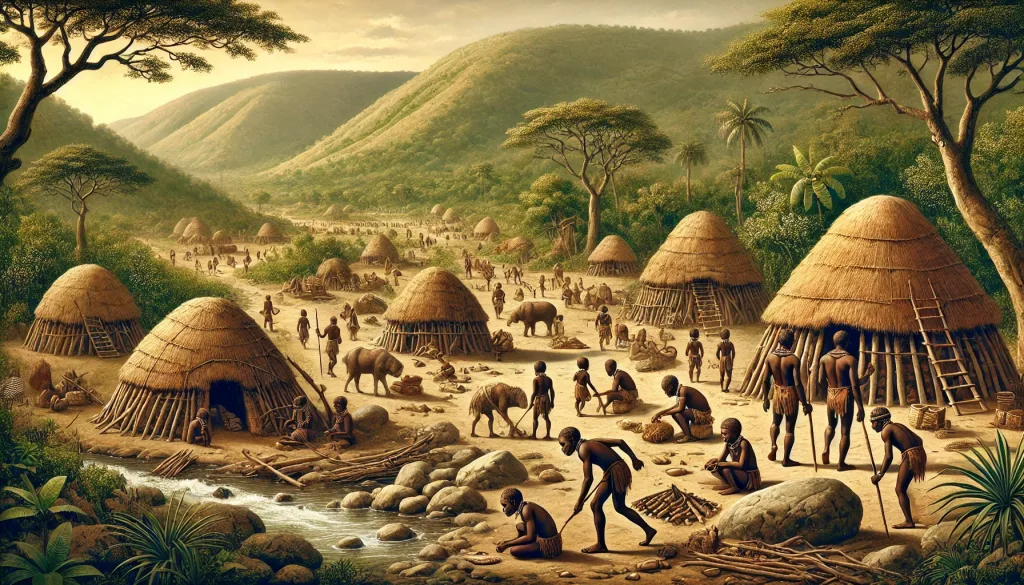The Emergence of the Proto-Yoruba Civilization: How the Oldest Negroid Race in Nigeria Shaped History Around 10,000 BC
The Arrival of the Proto-Yoruba
Around 10,000 BC, the Proto-Yoruba first appeared in what is now Nigeria. They began settling in the middle belt and northern regions of the country. This marked the arrival of the first Negroid people in the area, establishing the beginnings of what would become a key civilization in West Africa.
Displacing Earlier Populations
Before the Proto-Yoruba arrived, some scientists believe there were other humans inhabiting northern Nigeria. These people, known as Bushmanoids, were not Negroid but a different racial group, similar to those still found in southern Africa. As the Proto-Yoruba settled, these earlier populations seem to have been displaced. Evidence suggests that the Bushmanoids disappeared from Nigeria around the same time the Proto-Yoruba emerged, indicating the new race may have pushed them out.
Becoming the First Inhabitants of Western Nigeria
Interestingly, there is no evidence of human life in western Nigeria before the arrival of the Proto-Yoruba. They were the first people to inhabit the area, making them pioneers in that region. The oldest human remains found in western Nigeria are of a Proto-Yoruba individual, discovered at Iwo Eleru, near Akure. This skeleton has been dated to between 10,000 and 8,000 BC, offering tangible proof of the early presence of the Proto-Yoruba in that region.
The Significance of Their Emergence
The emergence of the Proto-Yoruba around 10,000 BC coincides with a significant period in human history. This era marked the last major evolutionary changes in Homo sapiens, making the Proto-Yoruba one of the last ancient human groups to develop. Their arrival was a key moment in the human story, as the Proto-Yoruba represent one of the newest "pristine" races of mankind, forming a bridge between the earlier stages of human evolution and more recent developments.
Classified as a Guinean Subdivision of the Black Race
The Proto-Yoruba are classified as part of the Guinean subdivision of the black race. This categorization places them among other West African groups like the Ashanti of Ghana and the Nupe of Nigeria. However, it’s important to note that the Yoruba race remains one of the purest examples of this group. Over time, intermixing with other ethnic groups has occurred, especially during the height of the Old Oyo Empire, when Yoruba traders and warriors traveled across West Africa. Despite this, the Yoruba have retained much of their distinct racial and cultural identity.
The Yoruba: Nigeria’s Oldest Race
As a result of their early arrival, the Yoruba race is the oldest known Negroid race in Nigeria. Their presence dates back about 10,000 to 12,000 years, predating the arrival of other races and ethnic groups in the region. This includes groups like the Fulani, who arrived much later and represent a hybrid of various races. The Fulani race, for instance, is only about 2,000 years old, making them a relatively recent addition to Nigeria's ethnic landscape.
The Ancient Yoruba Language
Another remarkable aspect of Yoruba history is their language. The Yoruba language is one of the oldest in the world, having been spoken for over 3,000 years. This fact contradicts the widely held belief that the Yoruba people originated from Mecca. The age of the Yoruba language far predates the Islamic era, suggesting that the Yoruba people have been established in West Africa much longer than some theories suggest.
The Early Life of the Proto-Yoruba
Initially, the Proto-Yoruba lived as hunters, fishers, and gatherers. They relied on simple tools made of stone and bone, which they used to hunt animals and gather food. Life was difficult, and survival often depended on the natural resources available. The Proto-Yoruba lived in small, communal groups and were frequently on the move, following food sources and adapting to changing conditions.
The Shift to Agriculture and Animal Domestication
However, a major turning point occurred when the Proto-Yoruba discovered agriculture and began domesticating animals. This shift from a nomadic lifestyle to settled farming communities allowed them to grow in numbers and establish more permanent settlements. As they cultivated crops and raised livestock, their society became more complex, laying the foundation for the Yoruba civilization that would later flourish.
The Influence of the Proto-Yoruba on Nigerian History
The Proto-Yoruba laid the groundwork for many of the cultural and societal developments that would follow in Nigeria. Their early settlement in the region and their advancements in agriculture, language, and community life helped shape the trajectory of West African history. As other races and ethnic groups arrived, the Yoruba maintained a dominant position, influencing trade, politics, and cultural exchanges throughout the region.
The Lasting Legacy of the Proto-Yoruba
In conclusion, the Proto-Yoruba’s emergence around 10,000 BC marks a key chapter in the story of humanity and Nigeria’s history. As one of the oldest and most distinct races in the region, their influence is still felt today. From their early mastery of agriculture to the development of the Yoruba language and culture, the legacy of the Proto-Yoruba continues to shape the lives of millions of people across Nigeria and beyond.
